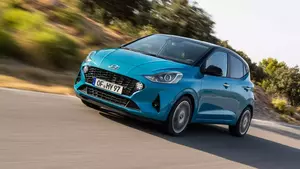
| Vehicle | Precise engine size | Difference from world average | Engine size to consumption ratio | Horsepower from 1 L | Engine size to 100 kg of weight |
|---|---|---|---|---|---|
| 1.2 MPi |
1.2 L (1197 cc) |
49% smaller | 28 cc to 1 mpg | 70 hp from 1 L | - |
| 1.0 MPi |
1 L (998 cc) |
57.5% smaller | 21 cc to 1 mpg | 67 hp from 1 L | 111 cc to 100 kg |
| Vehicle | 1.2 MPi |
|---|---|
| Precise engine size | 1.2 L (1197 cc) |
| Difference from world average | 49 smaller |
| Engine size to consumption ratio | 28 cc to 1 mpg |
| Horsepower from 1 L | 70 hp from 1 L |
| Engine size to 100 kg of weight | - |
| Vehicle | 1.0 MPi |
| Precise engine size | 1 L (998 cc) |
| Difference from world average | 57.5 smaller |
| Engine size to consumption ratio | 21 cc to 1 mpg |
| Horsepower from 1 L | 67 hp from 1 L |
| Engine size to 100 kg of weight | 111 cc to 100 kg |
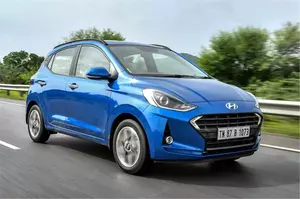
| Vehicle | Precise engine size | Difference from world average | Engine size to consumption ratio | Horsepower from 1 L | Engine size to 100 kg of weight |
|---|---|---|---|---|---|
| 1.2 |
1.2 L (1197 cc) |
49% smaller | - | 69 hp from 1 L | - |
| 1.2 CRDi |
1.19 L (1186 cc) |
49.4% smaller | - | 63 hp from 1 L | - |
| Vehicle | 1.2 |
|---|---|
| Precise engine size | 1.2 L (1197 cc) |
| Difference from world average | 49 smaller |
| Engine size to consumption ratio | - |
| Horsepower from 1 L | 69 hp from 1 L |
| Engine size to 100 kg of weight | - |
| Vehicle | 1.2 CRDi |
| Precise engine size | 1.19 L (1186 cc) |
| Difference from world average | 49.4 smaller |
| Engine size to consumption ratio | - |
| Horsepower from 1 L | 63 hp from 1 L |
| Engine size to 100 kg of weight | - |
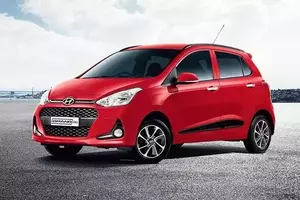
| Vehicle | Precise engine size | Difference from world average | Engine size to consumption ratio | Horsepower from 1 L | Engine size to 100 kg of weight |
|---|---|---|---|---|---|
| 1.0 LPG |
1 L (998 cc) |
57.5% smaller | 22 cc to 1 mpg | 69 hp from 1 L | 91 cc to 100 kg |
| 1.0 |
1 L (998 cc) |
57.5% smaller | 22 cc to 1 mpg | 67 hp from 1 L | 100 cc to 100 kg |
| blue 1.0 |
1 L (998 cc) |
57.5% smaller | 21 cc to 1 mpg | 67 hp from 1 L | 100 cc to 100 kg |
| 1.2 |
1.25 L (1248 cc) |
46.8% smaller | 29 cc to 1 mpg | 70 hp from 1 L | 125 cc to 100 kg |
| Vehicle | 1.0 LPG |
|---|---|
| Precise engine size | 1 L (998 cc) |
| Difference from world average | 57.5 smaller |
| Engine size to consumption ratio | 22 cc to 1 mpg |
| Horsepower from 1 L | 69 hp from 1 L |
| Engine size to 100 kg of weight | 91 cc to 100 kg |
| Vehicle | 1.0 |
| Precise engine size | 1 L (998 cc) |
| Difference from world average | 57.5 smaller |
| Engine size to consumption ratio | 22 cc to 1 mpg |
| Horsepower from 1 L | 67 hp from 1 L |
| Engine size to 100 kg of weight | 100 cc to 100 kg |
| Vehicle | blue 1.0 |
| Precise engine size | 1 L (998 cc) |
| Difference from world average | 57.5 smaller |
| Engine size to consumption ratio | 21 cc to 1 mpg |
| Horsepower from 1 L | 67 hp from 1 L |
| Engine size to 100 kg of weight | 100 cc to 100 kg |
| Vehicle | 1.2 |
| Precise engine size | 1.25 L (1248 cc) |
| Difference from world average | 46.8 smaller |
| Engine size to consumption ratio | 29 cc to 1 mpg |
| Horsepower from 1 L | 70 hp from 1 L |
| Engine size to 100 kg of weight | 125 cc to 100 kg |
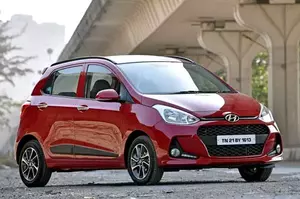
| Vehicle | Precise engine size | Difference from world average | Engine size to consumption ratio | Horsepower from 1 L | Engine size to 100 kg of weight |
|---|---|---|---|---|---|
| 1.2 VTVT |
1.2 L (1197 cc) |
49% smaller | - | 69 hp from 1 L | - |
| 1.2 CRDi |
1.19 L (1186 cc) |
49.4% smaller | - | 63 hp from 1 L | - |
| 1.2 |
1.2 L (1197 cc) |
49% smaller | - | 68 hp from 1 L | - |
| Vehicle | 1.2 VTVT |
|---|---|
| Precise engine size | 1.2 L (1197 cc) |
| Difference from world average | 49 smaller |
| Engine size to consumption ratio | - |
| Horsepower from 1 L | 69 hp from 1 L |
| Engine size to 100 kg of weight | - |
| Vehicle | 1.2 CRDi |
| Precise engine size | 1.19 L (1186 cc) |
| Difference from world average | 49.4 smaller |
| Engine size to consumption ratio | - |
| Horsepower from 1 L | 63 hp from 1 L |
| Engine size to 100 kg of weight | - |
| Vehicle | 1.2 |
| Precise engine size | 1.2 L (1197 cc) |
| Difference from world average | 49 smaller |
| Engine size to consumption ratio | - |
| Horsepower from 1 L | 68 hp from 1 L |
| Engine size to 100 kg of weight | - |
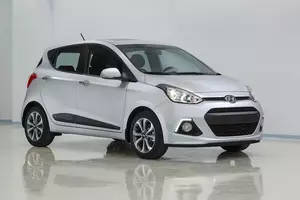
| Vehicle | Precise engine size | Difference from world average | Engine size to consumption ratio | Horsepower from 1 L | Engine size to 100 kg of weight |
|---|---|---|---|---|---|
| 1.2 |
1.2 L (1197 cc) |
49% smaller | - | 69 hp from 1 L | 120 cc to 100 kg |
| 1.1 CRDi |
1.12 L (1120 cc) |
52.3% smaller | - | 63 hp from 1 L | 112 cc to 100 kg |
| Vehicle | 1.2 |
|---|---|
| Precise engine size | 1.2 L (1197 cc) |
| Difference from world average | 49 smaller |
| Engine size to consumption ratio | - |
| Horsepower from 1 L | 69 hp from 1 L |
| Engine size to 100 kg of weight | 120 cc to 100 kg |
| Vehicle | 1.1 CRDi |
| Precise engine size | 1.12 L (1120 cc) |
| Difference from world average | 52.3 smaller |
| Engine size to consumption ratio | - |
| Horsepower from 1 L | 63 hp from 1 L |
| Engine size to 100 kg of weight | 112 cc to 100 kg |
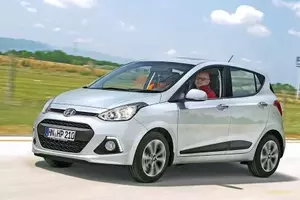
| Vehicle | Precise engine size | Difference from world average | Engine size to consumption ratio | Horsepower from 1 L | Engine size to 100 kg of weight |
|---|---|---|---|---|---|
| 1.25 16V |
1.25 L (1248 cc) |
46.8% smaller | 33 cc to 1 mpg | 70 hp from 1 L | 125 cc to 100 kg |
| 1.0 16V |
1 L (998 cc) |
57.5% smaller | 18 cc to 1 mpg | 67 hp from 1 L | 100 cc to 100 kg |
| Vehicle | 1.25 16V |
|---|---|
| Precise engine size | 1.25 L (1248 cc) |
| Difference from world average | 46.8 smaller |
| Engine size to consumption ratio | 33 cc to 1 mpg |
| Horsepower from 1 L | 70 hp from 1 L |
| Engine size to 100 kg of weight | 125 cc to 100 kg |
| Vehicle | 1.0 16V |
| Precise engine size | 1 L (998 cc) |
| Difference from world average | 57.5 smaller |
| Engine size to consumption ratio | 18 cc to 1 mpg |
| Horsepower from 1 L | 67 hp from 1 L |
| Engine size to 100 kg of weight | 100 cc to 100 kg |
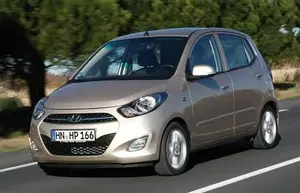
| Vehicle | Precise engine size | Difference from world average | Engine size to consumption ratio | Horsepower from 1 L | Engine size to 100 kg of weight |
|---|---|---|---|---|---|
| 1.1 |
1.09 L (1086 cc) |
53.7% smaller | 26 cc to 1 mpg | 63 hp from 1 L | 121 cc to 100 kg |
| 1.0 |
1 L (998 cc) |
57.5% smaller | 18 cc to 1 mpg | 69 hp from 1 L | 111 cc to 100 kg |
| 1.2 |
1.25 L (1248 cc) |
46.8% smaller | 24 cc to 1 mpg | 69 hp from 1 L | 139 cc to 100 kg |
| Vehicle | 1.1 |
|---|---|
| Precise engine size | 1.09 L (1086 cc) |
| Difference from world average | 53.7 smaller |
| Engine size to consumption ratio | 26 cc to 1 mpg |
| Horsepower from 1 L | 63 hp from 1 L |
| Engine size to 100 kg of weight | 121 cc to 100 kg |
| Vehicle | 1.0 |
| Precise engine size | 1 L (998 cc) |
| Difference from world average | 57.5 smaller |
| Engine size to consumption ratio | 18 cc to 1 mpg |
| Horsepower from 1 L | 69 hp from 1 L |
| Engine size to 100 kg of weight | 111 cc to 100 kg |
| Vehicle | 1.2 |
| Precise engine size | 1.25 L (1248 cc) |
| Difference from world average | 46.8 smaller |
| Engine size to consumption ratio | 24 cc to 1 mpg |
| Horsepower from 1 L | 69 hp from 1 L |
| Engine size to 100 kg of weight | 139 cc to 100 kg |

| Vehicle | Precise engine size | Difference from world average | Engine size to consumption ratio | Horsepower from 1 L | Engine size to 100 kg of weight |
|---|---|---|---|---|---|
| 1.1 |
1.09 L (1086 cc) |
53.7% smaller | 23 cc to 1 mpg | 61 hp from 1 L | 109 cc to 100 kg |
| 1.1 CRDi |
1.12 L (1120 cc) |
52.3% smaller | 20 cc to 1 mpg | 67 hp from 1 L | 102 cc to 100 kg |
| 1.2 |
1.25 L (1248 cc) |
46.8% smaller | 31 cc to 1 mpg | 62 hp from 1 L | 125 cc to 100 kg |
| Vehicle | 1.1 |
|---|---|
| Precise engine size | 1.09 L (1086 cc) |
| Difference from world average | 53.7 smaller |
| Engine size to consumption ratio | 23 cc to 1 mpg |
| Horsepower from 1 L | 61 hp from 1 L |
| Engine size to 100 kg of weight | 109 cc to 100 kg |
| Vehicle | 1.1 CRDi |
| Precise engine size | 1.12 L (1120 cc) |
| Difference from world average | 52.3 smaller |
| Engine size to consumption ratio | 20 cc to 1 mpg |
| Horsepower from 1 L | 67 hp from 1 L |
| Engine size to 100 kg of weight | 102 cc to 100 kg |
| Vehicle | 1.2 |
| Precise engine size | 1.25 L (1248 cc) |
| Difference from world average | 46.8 smaller |
| Engine size to consumption ratio | 31 cc to 1 mpg |
| Horsepower from 1 L | 62 hp from 1 L |
| Engine size to 100 kg of weight | 125 cc to 100 kg |